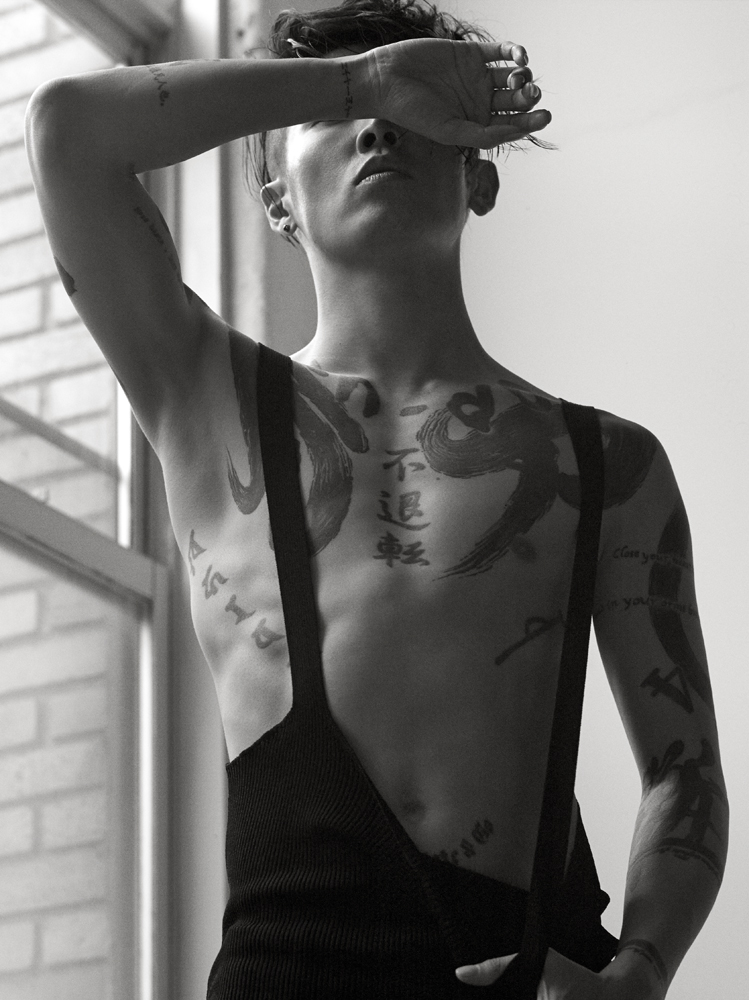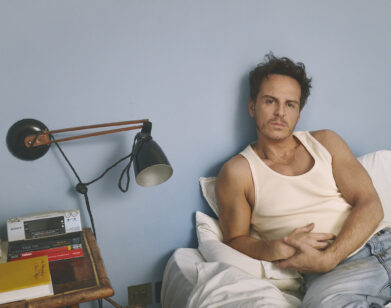Miyavi
As anyone who has paid exorbitantly for a screenwriting class, or just seen a few movies, can tell you, the traditional Hollywood fairy tale begins with a call to action—a summons that the reluctant hero initially declines. For the Japanese pop star Takamasa Ishihara, who performs under the stage name Miyavi, that call came rather literally, in the form of an invitation to meet with Angelina Jolie in 2013. At the time, Jolie was preparing to direct an adaptation of Laura Hillenbrand’s grueling survival saga Unbroken (from a script by William Nicholson, Richard LaGravenese, and Joel and Ethan Coen), about Olympic track star and World War II POW Louis Zamperini, and casting a wide net to find an actor to play the sadistic camp guard Mutsuhiro “The Bird” Watanabe. Miyavi, 33, who hadn’t to that point had any training or experience as an actor, was perhaps understandably reticent to take on such a savage role, let alone one from a book that is not exactly a fan favorite in his native Japan. But once assured by Jolie—and, really, who says no to Maleficent?—Miyavi found that, despite his seeming lack of preparation for the journey ahead, he was the perfect man for the part.
Miyavi was born in Osaka in 1981 and, as a boy, became a soccer star before an injury put out his dreams of playing professionally. Like the emotionally bent character he would go on to play, Miyavi says that he too was heavily pressured by his father, who made it clear to him that he was disappointed in his son. But after his injury, at age 15, Miyavi turned to music, pioneering a kind of slap style of playing his guitar and has, in the last decade or so, become a global star, touring to huge crowds and collaborating with artists like Tomoyasu Hotei and Good Charlotte. And after years of performing on stage, it is perhaps not surprising that his screen debut is so assured, so self-possessed. But Miyavi’s Bird has about him the kind of eye-catching quality from which stars are made. As he says from his new home in Los Angeles, he’s happy to play the villain, so long as we all learn from the hero, and he’s happy to keep climbing his magic beanstalk, wherever it may go.
CHRIS WALLACE: Hi. Are you in L.A. right now?
MIYAVI: Studio City. We just moved here a couple months ago.
WALLACE: Was the move a preparation for the future, or something that you’ve been looking forward to for a long time?
MIYAVI: As a musician, there are more experiences available in this city, and I want to keep producing. I just worked with Jam & Lewis, the producers, and the experience was really great. I wanted my daughters to have education in English, too. I really wanted to speak English because I started touring the world, and I wanted to communicate with people directly. Now when I’m on the road, I can talk to the local people, ask them about their local cultures. I can make friends.
WALLACE: How did Unbroken come about for you?
MIYAVI: To be honest, I was not sure if I was capable of doing it, because I had no experience as an actor. As a Japanese person, the story itself was really controversial. Some people in Japan still have a negative image of this story. There are some misunderstandings.
WALLACE: What do you think are the principal misunderstandings?
MIYAVI: Like, in Japan we eat the root of a plant; it’s called gobo and is kind of expensive, a delicacy. But the prisoners in this story didn’t know that, and they thought that when it was given to them by my character, it was a kind of torture. A cultural difference. I don’t think that the Bird, Mutsuhiro Watanabe, was right. I don’t think it was right what he did to Louis Zamperini. But I also didn’t want to represent any negative side of Japan. On stage, what I’m trying to deliver to the audience is totally the opposite—I’m trying to unite, beyond cultural differences, skin colors, or language. So it was a huge challenge for me to act the villain.
WALLACE: What convinced you that the wicked Watanabe wouldn’t come across as Hollywood shorthand for all of Japan?
MIYAVI: When I first met Angie in Tokyo, I wasn’t sure that I was going to do this, because talking about the war is still a sensitive issue in Japan. But even before I asked her, Angie said that she wanted to make a meaningful creation, which could be a bridge between America and Japan, not just a typical war movie. It’s all about the guy, Louis Zamperini, with an unbroken heart. And, as a musician, I see the story as the tracks on an album. You can’t fully express yourself with one track. The many topics or themes—happiness, sadness, loneliness—take several songs, several tracks. Film is the same, so as a villain, I thought that the more evil I become, the more dramatic the story gets. And the better it can deliver its message: forgiveness. In the end, Louis Zamperini came back to Japan for the Nagano Olympics. That’s something that only strong men can do. If you’re not strong enough, you can’t forgive. I thought it was really worth it to try to do this, to deliver that message. Even as a villain.
WALLACE: Did playing that part give you any perspective about how people can become so cruel, even within a war? Did you think a lot about how the Bird had become this sadist who’s even sort of sexually thrilled by the violence? Or did you always feel like you were outside of him, performing him?
MIYAVI: We are not in a battlefield now; I am a musician and am so thankful for that. I have no experience of war. But I find a similarity between performing music onstage and acting—a reality of emotion. On set, I tried to keep a distance from the other actors, from Jack [O’Connell], Garrett [Hedlund], John [Magaro]. They’re all nice guys. I really wanted to hang out and talk about music or whatever. But I kept a distance and tried to find a reality of emotion. I have two daughters, and I imagined, “What if they tried to kill my daughters?” Of course, to protect the family I love, I would kill them.
CHRIS WALLACE IS INTERVIEW‘S SENIOR EDITOR. MIYAVI WILL PLAY A SHOW AT THE EL RAY THEATRE IN LOS ANGELES, CALIFORNIA ON DECEMBER 14. FOR MORE INFO, CLICK HERE.







